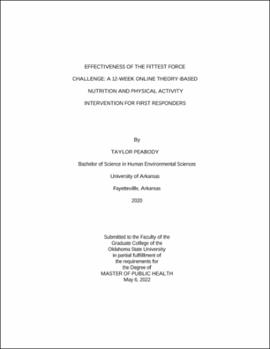| dc.contributor.advisor | Joyce, Jill | |
| dc.contributor.author | Peabody, Taylor | |
| dc.date.accessioned | 2023-03-21T21:03:45Z | |
| dc.date.available | 2023-03-21T21:03:45Z | |
| dc.date.issued | 2022-05 | |
| dc.identifier.uri | https://hdl.handle.net/11244/337146 | |
| dc.description.abstract | Firefighters and law enforcement officers (LEO) are at increased risk of cardiovascular disease (CVD) due to their current occupation and lifestyle practices. Highlighting this risk, 45% of on duty firefighter deaths are CVD related. The purpose of this study was to determine the effectiveness of a 12-week online nutrition and physical activity intervention based on group dynamics, Kohler effect, self-determination theory, and social cognitive theory for LEO and firefighters across the US. | |
| dc.description.abstract | Methods: Program effectiveness was tested using a quasi-experimental, pre-/ post-test design with a convenience sample of current firefighters or law enforcement officers over the age of 18 years recruited via social media and personal email contacts in the professions. Assessments included demographics, International Physical Activity Questionnaire (IPAQ), Behavioral Regulation in Exercise Questionnaire (BREQ-2), Exercise Self-Efficacy Scale (ESES), 24-hour food recall and Healthy Eating Index (HEI-2015) scores, body mass index (BMI), perceived knowledge of program topics, and program engagement. Chi-square and paired t-test were used to determine difference from pre- to post-program. | |
| dc.description.abstract | Results: Ninety-two participants completed the pre-program assessment, while 13 individuals completed the post-program assessment and were matched. There were significant increases between pre- and post-program assessment for matched participants in perceived knowledge for nutrition literacy (p=0.002), increasing fruit and vegetable intake (p<0.001), incorporating whole grains (p=0.005), setting up social supports (p=0.023), creating food environments for dietary change (p=0.008), safe and effective supplement use (p=0.009), safe caffeine consumption (p=0.003), and eating healthy while eating out (p=0.009). There was also a significant decrease in sedentary time from pre- to post-program (p=0.001). | |
| dc.description.abstract | Discussion: This online challenge program was effective in increasing perceived knowledge and decreasing sedentary time. This pilot provides guidance for future programming with this population, in addition to serving as an immediate, inexpensive, high reach, and evidence-based resource. | |
| dc.format | application/pdf | |
| dc.language | en_US | |
| dc.rights | Copyright is held by the author who has granted the Oklahoma State University Library the non-exclusive right to share this material in its institutional repository. Contact Digital Library Services at lib-dls@okstate.edu or 405-744-9161 for the permission policy on the use, reproduction or distribution of this material. | |
| dc.title | Effectiveness of the Fittest Force Challenge: A 12-week online theory-based nutrition and physical activity intervention for first responders | |
| dc.contributor.committeeMember | Dawes, Jay | |
| dc.contributor.committeeMember | Rhoads, Kelley | |
| osu.filename | Peabody_okstate_0664M_17599.pdf | |
| osu.accesstype | Open Access | |
| dc.type.genre | Thesis | |
| dc.type.material | Text | |
| dc.subject.keywords | behavior change | |
| dc.subject.keywords | cardiovascular disease | |
| dc.subject.keywords | nutrition | |
| dc.subject.keywords | online | |
| dc.subject.keywords | physical activity | |
| dc.subject.keywords | tactical athlete | |
| thesis.degree.discipline | Public Health | |
| thesis.degree.grantor | Oklahoma State University | |
